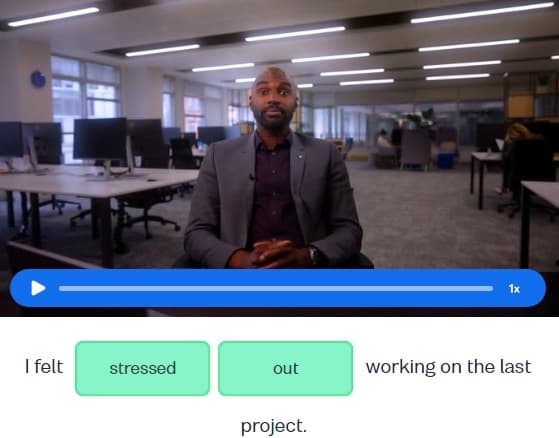I want to learn...
Picture the scene: You’ve been learning Japanese for 3 years. You’re in Kyoto trying to order some green tea ice cream but your mind goes blank. How do you say “green tea” again? You search your brain for the word and now there’s a line of people forming behind you. Your palms start to sweat. You feel nervous down in your stomach. You know the word for green tea — you prepared especially for this trip to Kyoto. You’ve studied so hard, you can’t understand why you forgot such a simple word.
The reason you forgot might be foreign language anxiety. It doesn’t matter how hard you’ve studied or prepared, actually being out in the wild using your new language is totally different.
Foreign language anxiety is a common problem for language learners. But don’t worry — we’re here to help. This guide will help you understand foreign language anxiety and give you some practical tips to overcome it.
What is foreign language anxiety?
Foreign language anxiety (FLA) is feelings of nervousness, worry, or stress when learning or using a foreign language. When you think about it, it makes total sense. Anxiety is a natural response to a challenging task. And learning — or using — a foreign language is super challenging.
The problem is, FLA can make you reluctant to study or practice, and you might avoid conversations. Of course, this impacts your learning gains and your progress is much slower. Which then makes you more likely to get nervous. It’s a difficult cycle to get out of.
Side note: There are a bunch of interesting English words that come from Greek to describe fears. For example, arachnophobia is a fear of spiders, and claustrophobia is a fear of closed spaces. Xenoglossophobia is the fear of using foreign languages — in other words, foreign language anxiety.
The components and symptoms of foreign language anxiety
There are three components of foreign language anxiety. They all combine to get in the way of your language learning. The physical symptoms are sweating, trembling, or a racing heart. And there are mental symptoms like blanking out, constant worry, or negative self-talk.
Let’s unpack the three factors of foreign language anxiety:
1. Fear of communication
This is the fear of communicating in a foreign language. Like the example from the introduction, this is the FLA that causes you to struggle in conversations, unable to remember words you definitely know, listening but not understanding.
2. Fear of negative evaluation
Some anxiety comes from worrying about what others think about your language skills. When learning a new language, it’s normal to think to yourself "Everyone will laugh if I make a mistake" or "People will think I'm not intelligent enough." This fear paralyzes and makes people self-conscious and reluctant to get involved.
3. Fear of tests
FLA also pops up in professional and academic environments. It’s the fear you feel when you’ve got a language assessment coming up. The fear that makes your mind go blank in the middle of a test. Fear of failure causes this anxiety. You worry about failing the test, but also what failure means about your intelligence or language abilities.
Do you have foreign language anxiety?
Let’s go through a simple quiz to see if you struggle with foreign language anxiety. Just answer these simple questions:
Quiz
When you speak in a foreign, do you hesitate, even though you know the correct words?
Yes [ ] No [ ]Do you worry about making mistakes in a foreign language?
Yes [ ] No [ ]Have you ever not participated in conversations because of worrying about your language skills?
Yes [ ] No [ ]Does your heart race or do you get sweaty palms when talking in a foreign language?
Yes [ ] No [ ]Do you ever say to yourself things like “I’ll never understand this grammar,” or “I’m so bad at learning languages?”
Yes [ ] No [ ]Do you avoid speaking with native speakers in your new language because you worry about what they’ll think of your language skills?
Yes [ ] No [ ]Have you ever blanked out when using a foreign language, unable to remember words or phrases you know?
Yes [ ] No [ ]Do you care what other people think about your language skills?
Yes [ ] No [ ]Do language tests make you more anxious than other kinds of tests?
Yes [ ] No [ ]Does thinking about making mistakes harm your motivation to learn a foreign language?
Yes [ ] No [ ]
Let’s take a look at what the results mean on the table below:
Table of results
| Mostly Yes | You might have foreign language anxiety. Remember, most language learners suffer from FLA. And being aware of your own FLA is the first step to overcoming it. |
|---|---|
| A mix of Yes and No | You might have mild FLA in some situations. Our advice is to identify the situations that cause you the most anxiety, so you can find the best strategies to help. |
| Mostly No | You seem to be free from FLA. |
Experiencing FLA is a natural reaction to the challenge of learning a language. It isn’t a sign of failure or lack of ability. It isn’t something you should feel bad or ashamed about. In the next section, you’ll learn some practical tips to help you manage your FLA.
How to manage your foreign language anxiety
Let’s take a look at the top tips to help you overcome foreign language anxiety.
1. Customize your learning approach
One of the keys to learning a language is finding a method that works for you. Because there are countless ways to learn a language but they aren’t suitable for everyone. Finding a method that fits you is a great way to reduce anxiety. So explore different methods until you find the one that suits you best.
2. Embrace communication over perfection
Being an effective communicator is more important than having perfect grammar. Your language teachers at school might not have told you this — but it’s true. Here’s a secret: People can understand you, even if you make mistakes. Being clear and easy to understand should be your goal.
So don’t worry about small things. No one cares if you use the wrong verb tense if they understand your overall meaning. Our advice: Embrace your mistakes.
Because your listeners don’t care about them as much as you do.
3. Transform negative thoughts into positive outcomes
Negative thoughts and FLA are common partners. Negative thinking feeds your FLA. And FLA leads to more negative thinking. When you catch yourself thinking negative thoughts, turn it around. Try to make the thought positive.
You can reframe your negative thoughts like this: Instead of saying “I can’t believe I made that mistake,” say “Now I know what not to do next time.” Or instead of saying “I have to practice speaking Spanish,” say “I’m lucky that I get to practice speaking Spanish.”
This simple reframing of your negative thoughts — and the positive thinking that comes from it — can boost your confidence and reduce your anxiety. It might seem weird when you do it the first few times, but stick with it.
4. Set realistic and attainable goals
Set SMART (Specific, Measurable, Achievable, Relevant, Time-bound) goals for your language learning. For someone learning Japanese for professional reasons “I will learn 10 new" is a SMART goal. Importantly, it’s not too difficult to achieve. When you set goals that are too difficult, you’re likely to fail. This hurts your confidence and feeds your FLA.
Don’t aim for perfection. Set goals that are relevant to your needs and you know you can achieve. And make sure to celebrate all your small wins. Learning a language takes a lot of time and hard work, so reduce the obstacles by making the experience as positive as possible. If that means celebrating with cake because you hit your target of 10 phrases per week, eat that cake and enjoy your success.
You can overcome foreign language anxiety
When you suffer from foreign language anxiety, it might feel like you’ll never overcome it. But you can. By following these simple tips, you can manage your foreign language anxiety. And when you do that, you remove any obstacles stopping you from achieving your language goals.
AUTHOR

Barney Meekin
Newlanguages


